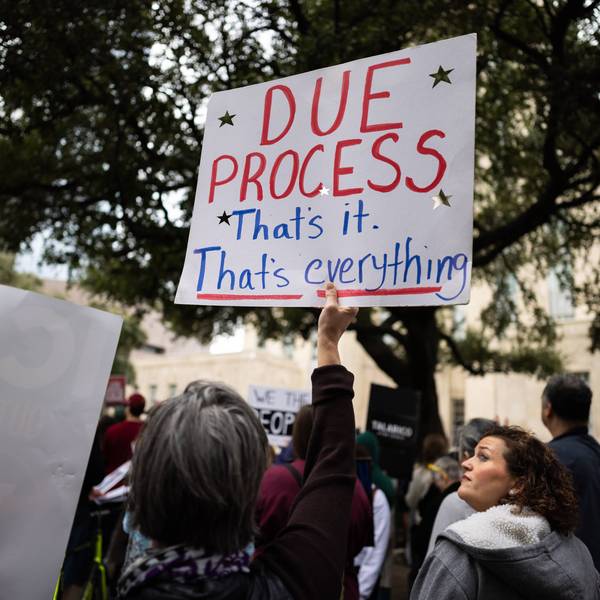For many African-Americans today, the main battle field against terrorism is not Iraq or Afghanistan but Jena, a small town in the state of Louisiana.
This rural town about 40-miles northeast of Alexandria, La is where a group of six black teens are enduring criminal prosecutions for a school yard fight that many see as a legal lynching.
The prosecutor in Jena is pressing serious felony charges for this fight that produced no serious injury on the specious claim that the Jena 6 used deadly weapons in that fight: their tennis shoes...used to allegedly kick the white victim.
This is the same prosecutor who refused to pursue comparable felony charges against white teens who smashed a black teen in the head with a beer bottle while ejecting him from a 'whites-only' party and a young white man who pointed a shotgun at black teens.
The reason why African-Americans react to the Jena injustice as domestic terrorism is rightly rooted in America's history of racism...that scourge that still infects American society and is still widely ignored.
For most Americans, the face of terrorism is a foreign Islamofascist.
However, for African-Americans - long before 9/11 - the face of racism enforcing domestic terrorism was a fellow citizen wearing blue suits or black robes as well as white KKK sheets.
The series of incidents in Jena culminating in the charges against those six teens, for example, began last fall when lynch nooses were hung from the only tree in the yard at the town's high school.
Nooses dangled after black students dared share the shade under traditionally reserved 'whites-only' gathering spot.
Top Jena school district officials overruled the principal's recommendation to expel the white students responsible to hanging the nooses dismissing their inflammatory action as an adolescent prank.
For blacks, lynching is not a matter easily dismissed.
A 1919 NAACP report on lynching listed Louisiana as ranking fourth behind Georgia, Mississippi and Texas in the number of officially recorded incidents of this type of racist terrorism.
Thousands often attended lynching, once known as America's 'blood sport.' Beyond mob-justice against alleged criminals, lynching was a device for social control, ethnic cleansing and economic theft.
In July 1934 a prosecutor in Bastrop, La - about 60-miles north of Jena - refused to investigative the lynching of a black man in that town's public square. This prosecutor told a mob numbering 3,000 that he "sympathized with its attitude" moments before the hanging of this suspected criminal, according to an account in a New York newspaper.
The sympathy shown to whites by that prosecutor in Bastrop is eerily similar to sympathies displayed by the white prosecutor in Jena whose impermissible race based charging practices violate any legal discretion given prosecutors for lodging charges.
In June 2005, when the US Senate approved a resolution apologizing for that body's failure to enact federal anti-lynching legislation, Senators refusing to support that apology included Senators from Georgia, Mississippi and Texas...the top three lynch states in that 1919 NAACP report.
Louisiana Senator Mary Landrieu initiated that anti-lynching resolution. Landrieu recently called for a US Justice Department investigation into the Jena incidents which now garner national attention.
Many across America take comfort in the claim that racism today is a minor matter due to the civil rights success of the 1960s. This comfort is a consequence of one of the most effective tools in the arsenal of institutional racism: Weapons of Mass Deception.
One misinformed comfort from WMD fallout is that the US Supreme Court has a century old tradition of correcting race based excesses.
The outrage of lynching, for example, received a critical legal underpinning by the Supreme Court ruling arising from the 1873 massacre at the courthouse in Colfax, La. A white mob murdered over 100 blacks during a voting rights dispute.
That massacre produced charges against ninety-six people. The nine guilty verdicts resulted from convictions for conspiring to prevent blacks from exercising rights protected by the US Constitution - not murder.
The US Supreme Court tossed those convictions, proclaiming federal civil rights law only barred unconstitutional acts by state governments, not actions by individuals...even though some defendants were government employees: police.
Further, the court falsely claimed racial hostility did not motivate that mob.
Currently, conservative Supreme Court justices use the phrase "the constitution is color blind" when maliciously voiding civil rights measures.
These justices pervert the context of that phrase coined by the lone justice criticizing the Court's infamous 1896 separate-but-equal racial segregation ruling in a case from New Orleans.
In fairness to fact, race based prosecutions are not limited to Jena.
Last year, prosecutors in Philadelphia secured a conviction against a noted black community activist falsely charged with attacking police while giving community service to a white major league baseball player who ironically attacked a policeman in a drunken rage hours before police beat the activist.
Many of the activists calling attention to Jena assail racial prosecutions places as far flung as Benton Harbor, Michigan and San Francisco, Ca.
Race prejudice infects the US justice system from the prosecutor in Jena to Supreme Court justices, making a mockery of the term homeland security for millions of non-white American citizens.
Dr. Martin Luther King Jr. in his famous 1963 "I Have A Dream" speech - lauded by conservatives and liberals alike - urged America to lift itself from the "quick sands of racial injustice."



